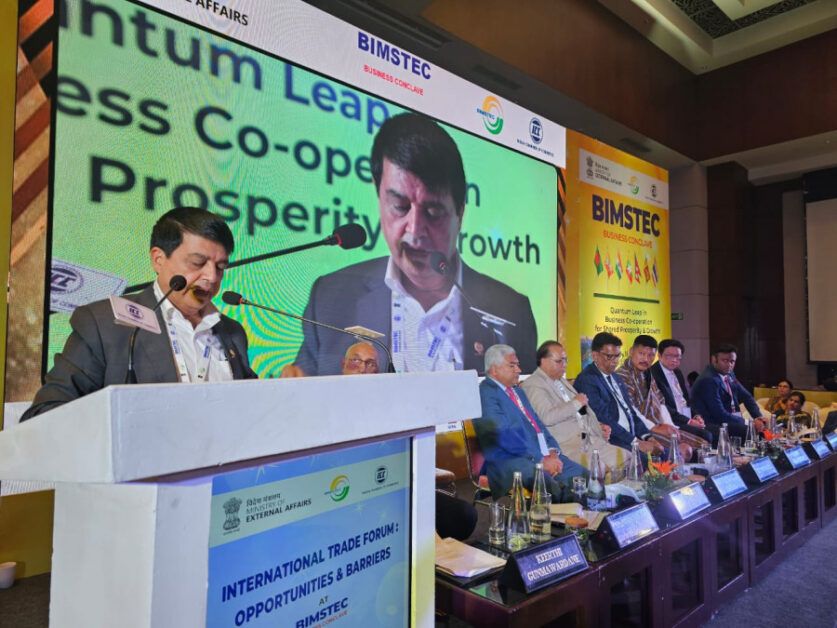The Federation of Nepalese Chambers of Commerce and Industries (FNCCI) President Chandra Prasad Dhakal floated the idea for the formation of the BIMSTEC Business Forum to boost intra-region trade and investments in the member countries among their private sector.
Speaking at the Special Plenary Session of the International Trade Forum during the Bay of Bengal Initiative for Multi-Sectoral Technical and Economic Cooperation (BIMSTEC) Business Conclave in Calcutta, India, President Dhakal said as the private sector is involved in trade and investment, the formation of a business forum would achieve commercial success.
He further said that to foster regional trade and investments, there is a need for an efficient and effective infrastructure such as land, waterway, rail, air and digital connectivity.
“We need to jointly invest to improve the existing connectivity infrastructure and also build new ones for better connectivity.”
Similarly, enhancing physical infrastructure, such as roads, ports, and logistics facilities was essential for the efficient movement of goods within the region, he said, adding, joint efforts could be made to develop and upgrade infrastructure to support the development of regional value chains.
“Promoting cross-border energy cooperation, including the development of energy infrastructure and efficient energy trade can support the growth of energy-intensive industries within the regional value chains.
For example, Nepal- Bangladesh and India have been working on hydropower transmission lines, to export electricity produced in Nepal, to Bangladesh, via India. “The success of such a project can be expanded to other BIMSTEC nations and beyond as well,” Dhakal said.
In addition to connectivity infrastructure, BIMSTEC countries need to remove and reduce the various non-tariff barriers for trade, making the regional trade and investments smooth.
BIMSTEC nations can work towards aligning their trade and investment policies to create a conducive environment for regional value chains. “This can involve streamlining customs procedures, simplifying regulations and promoting investment facilitation measures,” said Dhakal.
He added: “The free trading arrangement in the region can facilitate increased bilateral and multilateral trade among the member countries. Nepal can benefit from the removal or reduction of tariffs for its exports, leading to a boost in trade volumes and diversification of its export base.”
Dhakal said the regional connectivity and free trade agreements would also help attract foreign direct investments (FDI).
“Smooth and strong regional connectivity and free trade arrangement will help attract FDI. Improved market access and reduced trade barriers will encourage foreign companies to invest in various sectors of the economy, leading to economic growth and job creation in the BIMSTEC countries,” he added.
The share of all BIMSTEC countries — that include two ASEAN member-states – Thailand and Myanmar — is less than 4 percent in world trade.
The BIMSTEC intra-regional trade was at $70 billion in 2021, significantly lower than ASEAN’s $600 billion. The BIMSTEC members have agreed to establish the BIMSTEC Free Trade Area Framework Agreement in order to stimulate trade and investments. BIMSTEC countries’ existing trade and investment profiles are overwhelmingly influenced by their levels of economic development, geographical proximity, cross-border logistic facilities and different regional cooperation agreements.





